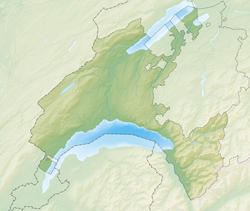Vaux-sur-Morges
| Vaux-sur-Morges | ||
|---|---|---|
|
||
| Coordinates: 46°32′N 06°28′E / 46.533°N 6.467°ECoordinates: 46°32′N 06°28′E / 46.533°N 6.467°E | ||
| Country | Switzerland | |
| Canton | Vaud | |
| District | Morges | |
| Government | ||
| • Mayor |
Syndic Philippe Sutter |
|
| Area | ||
| • Total | 2.1 km2 (0.8 sq mi) | |
| Elevation | 504 m (1,654 ft) | |
| Population (Dec 2015) | ||
| • Total | 203 | |
| • Density | 97/km2 (250/sq mi) | |
| Postal code | 1126 | |
| SFOS number | 5650 | |
| Surrounded by | Bussy-Chardonney, Clarmont, Colombier, Monnaz, Reverolle, Vufflens-le-Château | |
| Website |
www Profile (French), SFSO statistics |
|
Vaux-sur-Morges is a municipality in the Swiss canton of Vaud, located in the district of Morges.
Vaux-sur-Morges has an area, as of 2009[update], of 2.1 square kilometers (0.81 sq mi). Of this area, 1.57 km2 (0.61 sq mi) or 74.8% is used for agricultural purposes, while 0.28 km2 (0.11 sq mi) or 13.3% is forested. Of the rest of the land, 0.22 km2 (0.085 sq mi) or 10.5% is settled (buildings or roads).
Of the built up area, housing and buildings made up 4.8% and transportation infrastructure made up 4.8%. Out of the forested land, 9.5% of the total land area is heavily forested and 3.8% is covered with orchards or small clusters of trees. Of the agricultural land, 61.4% is used for growing crops and 9.5% is pastures, while 3.8% is used for orchards or vine crops.
The municipality was part of the Morges District until it was dissolved on 31 August 2006, and Vaux-sur-Morges became part of the new district of Morges.
The blazon of the municipal coat of arms is Gules, a Bar Argent between three Escallops Or, two and one.
Vaux-sur-Morges has a population (as of December 2015[update]) of 203. As of 2008[update], 12.1% of the population are resident foreign nationals. Over the last 10 years (1999–2009 ) the population has changed at a rate of 24.6%. It has changed at a rate of 13% due to migration and at a rate of 13.8% due to births and deaths.
Most of the population (as of 2000[update]) speaks French (139 or 88.0%), with English being second most common (11 or 7.0%) and German being third (5 or 3.2%).
...
Wikipedia




